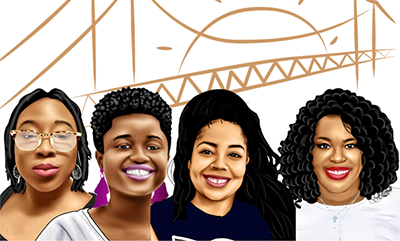New Podcast Makes Public Health ‘Accessible and Digestible’.

When they were School of Public Health students just a few short years ago, Dara Oloyede, Ryann Monteiro, Fatima Dainkeh, and Breanna Chachere could often be found deep in conversation with each other about their personal experiences as Black women, and their perspectives on health issues that impact Black and Indigenous people of color.
The four alums have remained friends since they completed the MPH program in May 2018, and now they are bringing their diverse points of view and public health insight to the digital space as co-hosts of a new podcast called Project BLACCK, which stands for Bridging Love, Access, Community Care, and Knowledge.
Launched in June, the podcast is a platform for the public health professionals to share honest and reflective conversations about health at the intersection of race, social justice, and equity, in an informative and nonjudgmental format for BIPOC communities and the broader public. It is available to download on major platforms including Apple, Spotify, Google, Anchor, Breaker, and Listen Notes.
“A lot of public health podcasts are geared toward public health professionals who live and breathe public health terminologies and theories. We wanted to create a podcast that would make public health more accessible and digestible to people who don’t know a lot about what public health is.” says Oloyede.
Originally, the alums’ intended to focus conversations on their shared interest in maternal and child health, but they decided to explore a variety of public health issues, informed in part by their diverse personal, cultural, academic, and professional backgrounds, and their collective understanding of life as Black women. Monteiro is a program manager in SPH’s Office of Graduate Student Life and is Aquinnah Wampanoag and Cape Verdea; Chachere is a first-year medical student in the inaugural class at The University of Houston College of Medicine, and is African American and Creole; Dainkeh is the learning and development manager at the Boston-based organization She+ Geeks Out and whose parents immigrated to the US from Sierra Leone; and Oloyede is the program coordinator for the 3 Steps in 30 Days Program at Action for Boston Community Development (ABCD), and is Nigerian.
“Our goal is to bridge the academic world and the real world” and to widen the discussion about what factors affect our health—from the perspective of Black and brown communities, says Chachere, who draws upon the conversations she had growing up in her household. “Before graduate school, I didn’t really know where to go to ask questions about health, or where I could advise my family to go to find accurate information. We pick health topics that are relatable, and take what we have learned in school back to the community so that people are able to get the information that they’re seeking and to also initiate these conversations about what it means to be healthy within their communities.”
The co-hosts have engaged in candid discussions about self-worth, health disparities and inequities, black men’s mental health and fatherhood, the health of Indigenous and LGBTQIA+ populations, and more.
But the alums stop short of presenting themselves as experts on any one topic, stressing instead the importance of continuous learning by listening and engaging with each other, other public health colleagues, and their audiences.
“We’re all still learning and navigating public health,” says Monteiro. “I learn from Fatima, Breanna, and Dara every time we speak.”
The group has also invited colleagues and leaders within the field to join their discussions. Craig Andrade, associate dean of public health practice and director of the Activist Lab at SPH was a guest during a Father’s Day episode on black men’s health, sexologist Marla Renee Stuart participated in a discussion on sexual health and intimacy, and fellow SPH alum Hoisum Nguyen (SPH’20) joined the hosts to speak about LGBTQIA+ health during Pride Month in June. The co-hosts also seek questions and input from their audiences on social media.
“We appreciate perspectives from our Black and brown communities, so we try to include their voices,” says Dainkeh. “Part of our acronym is “Community Care”—we’re not just thinking about ourselves, but also about what folks can learn from people who look like them. Representation is key.”
In upcoming episodes, the alums will continue to explore issues close to their hearts, including the intersection between food and health, maternal and child health storytelling, voting, and gaps in the healthcare system. The next episode will feature alum Chrystel Murrieta Ruiz (SPH’18) for a conversation on policy, voting, and activism.
Monteiro says she hopes Project BLACCK will not only inform their audiences, but provide a sense of comfort and relatability for listeners who have experienced any of the injustices or challenges that the alums examine. “These are conversations that we were having on our couches, and to be able to bring that to this platform and let people know that these discussions are normal to have is one of our main goals,” she says.
Stay informed about upcoming episodes by following Project BLACCK on Instagram, Twitter, and Facebook.